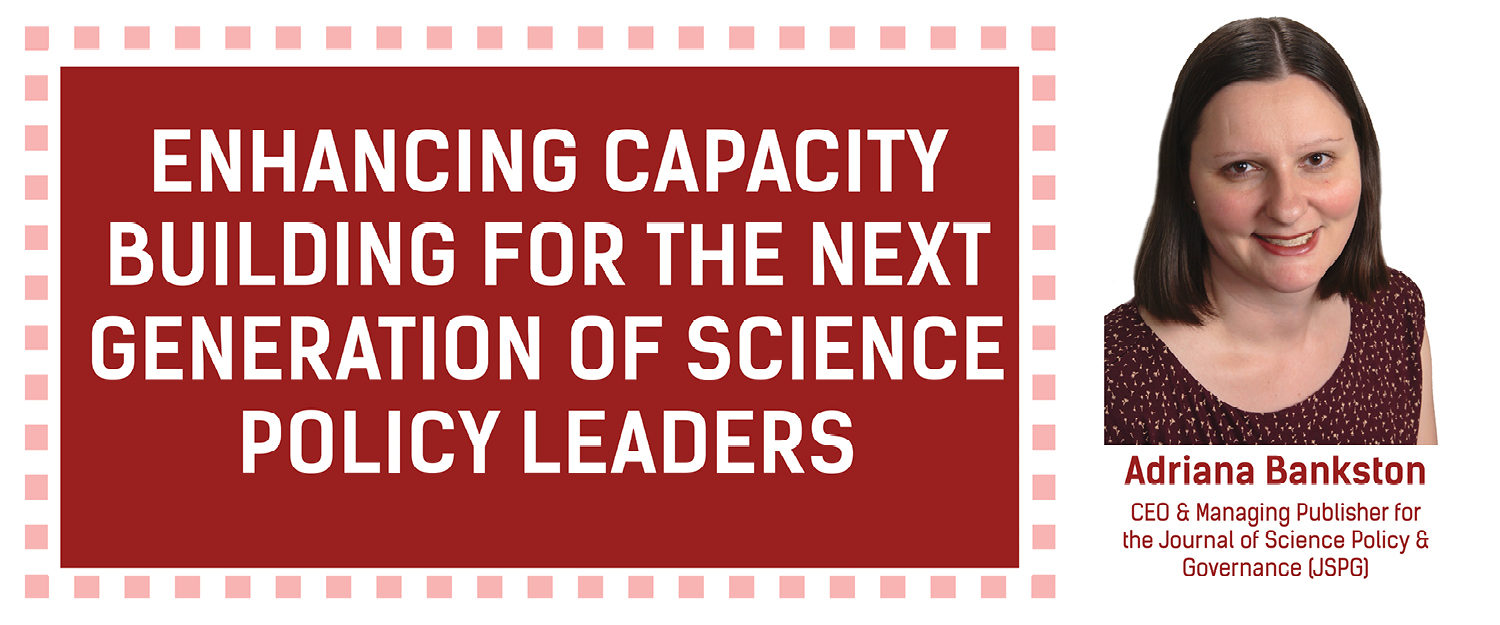Enhancing Capacity Building for the Next Generation of Science Policy Leaders in the Post-Pandemic Era

Author(s):
Adriana Bankston
Journal of Science Policy & Governance (JSPG)
CEO & Managing Publisher
The COVID-19 pandemic has fundamentally changed our society, requiring innovative adaptations to a new reality. While the pandemic has highlighted many inequities, it provides the opportunity to build forward in ways that ensure diversity, equity and inclusion as central to a better future for all.
Science and technology policy plays a critical role in building forward better, as we re-imagine the future of our society in the post-pandemic era. In this time of global change, it is imperative to equip the next generation of leaders in science and technology policy with the skills, tools and resources needed to drive the future of the field forward.
Capacity building for the next generation of science policy leaders requires multiple stakeholders to participate. This includes universities, funding agencies, scientific societies, nonprofits and other organizations that can help create an ecosystem for developing the leaders of tomorrow in science and technology policy.
Building such an ecosystem will require multiple aspects to be fulfilled, which can take the field into the 21st century. The first aspect is significant institutional reforms needed to incorporate science and technology policy training into classroom offerings. This may take the form of courses, certificate programs or degree programs in science and technology policy that can help broaden the horizon and expand the outlook of young scholars on important societal issues, and enable them to design ways in which they can make an impact.
The second aspect is offering rewards in the form of supplements on grants to faculty who provide mentoring to support trainees towards successful science policy careers. This may also occur through fellowships awarded directly to trainees. Both avenues would integrate policy aspects of research performed by young scholars into their dissertations, and encourage mentors to emphasize broader impacts of their work. Finally, the third aspect is developing tools and resources to enhance communication skills for the next generation in science and technology policy, which is critical to their career success. This often occurs through nonprofits and other organizations that can supplement already existing training within universities.
As such, strong skills in policy research and writing are a critical part of professional development for the next generation in science and technology policy, enabling young scholars to translate their innovative ideas into reality. The Journal of Science Policy & Governance (JSPG) provides students, post-docs, policy fellows and early career professionals with a platform for making their innovative science policy ideas more widely known, conveying them in a compelling manner to broad audiences, and elevating them across international platforms that are both influential and relevant.
For many rising stars in science policy, publishing in JSPG is a significant stepping stone into the field and a pivotal opportunity to kick-start or further develop their careers. JSPG staff elevate published work in high level forums where early career voices from all backgrounds are represented and can significantly impact the future of science policy. Among the spaces where JSPG published authors have discussed their work include presentations on climate change solutions at the British Embassy Washington, and participation in inter-generational policy debates around emerging technologies with experts in the United Nations.
It is critical that diversity, equity and inclusion are central to our future vision for the landscape of science and technology policy, and to ensure that the next rising stars come from all backgrounds and have the opportunity to drive the field forward with their innovative ideas.
This is particularly important post-pandemic, where the policy landscape will have fundamentally changed from what it is today, and where young voices need to be at the table now more than ever to pave the way towards innovation in science and technology policy on a global scale.

